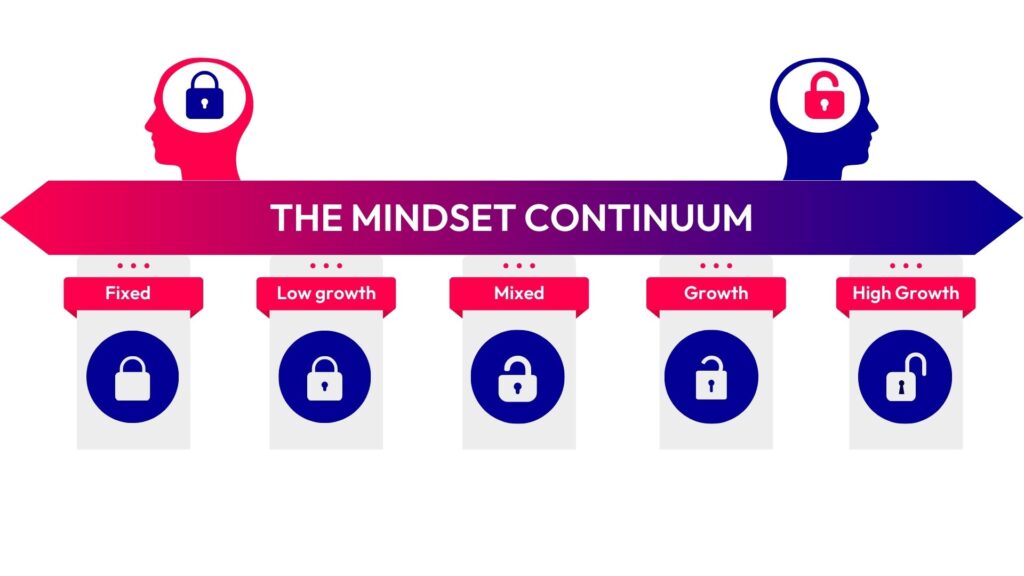In leadership, one of the most powerful ways to drive change, innovation, and continuous improvement is by adopting a growth mindset. Introduced by psychologist Carol Dweck, this concept is based on the belief that intelligence and abilities aren’t fixed but can be developed through dedication and hard work. This mindset fosters a love for learning and resilience in the face of challenges—qualities that are essential for great leadership.

What is a Growth Mindset?
At its core, a growth mindset is about believing that you can improve your abilities through effort and persistence. Leaders who embody this mindset don’t shy away from challenges but embrace them as opportunities to grow. Here are the key elements of a growth mindset:
- Embracing Challenges: Leaders with a growth mindset don’t see challenges as threats but as chances to stretch their abilities. They actively seek out opportunities that push their limits.
- Learning from Feedback: Constructive feedback is welcomed, not feared. Leaders with a growth mindset value input from their teams, peers, and mentors as a way to identify areas for improvement and grow.
- Viewing Failure as Opportunity: Setbacks are not viewed as failures but as learning experiences. These leaders understand that failing is part of the process of innovation and that the lessons learned often lead to greater success in the long run.
- Effort and Persistence: Leaders who adopt a growth mindset believe in the value of sustained effort. They don’t give up easily but persist in the face of obstacles, knowing that progress often requires time and patience.
Why Leaders with a Growth Mindset Get Better Results
Leaders with a growth mindset foster environments where their teams feel safe to take risks, experiment, and learn from their mistakes. This creates a culture of innovation and continuous improvement. Research supports the idea that this approach gets better results. A study by the Harvard Business Review found that teams with diverse perspectives are 35% more likely to outperform their counterparts. When leaders encourage a growth mindset within their teams, they unlock creativity and collaboration, which leads to higher performance and innovation.
Organisations that prioritise this mindset are not only more resilient to change but also better equipped to handle complex challenges, leading to more innovative solutions and a competitive edge in the market.
How to Build a Culture of Learning and Innovation
Leaders play a crucial role in embedding the growth mindset into their organisation. Here’s how you can make it happen:
1. Lead by Example
A growth mindset starts at the top. Leaders need to demonstrate their own commitment to learning by actively seeking out feedback, admitting when they don’t have all the answers, and being open to change. When leaders show that they’re willing to grow, it inspires their teams to do the same.
2. Encourage Experimentation and Risk-Taking
Creating a culture of innovation requires an environment where teams feel safe to take risks and try new ideas. Encourage your team to experiment and make it clear that mistakes are part of the learning process. The key is to ensure that failures are treated as opportunities to learn and improve, not as reasons to assign blame.
3. Regularly Reflect and Learn
One of the hallmarks of a growth mindset is the ability to reflect on past experiences and use them as learning opportunities. Create regular moments of reflection within your team, such as project debriefs or personal performance reviews, where individuals can assess what went well, what could be improved, and how they can apply those lessons moving forward.
4. Invest in Mentoring
Mentoring is a way to help individuals adopt a growth mindset. A mentor encourages mentees to challenge themselves, reflect on their progress, and learn from setbacks. At The Human Edge, our Mentoring Skills and Practice course helps leaders build these mentoring skills, enabling them to support their teams’ continuous growth.
The Impact of a Growth Mindset on Organisational Success
When leaders adopt and promote a growth mindset, they create a culture that thrives on learning and continuous improvement. Teams become more innovative, collaborative, and resilient. As a result, organisations that prioritise a growth mindset are more likely to achieve sustained success and remain competitive in a rapidly changing world.
One of the key advantages of a growth mindset is that it fosters diversity of thought and collaboration. By encouraging diverse perspectives and open dialogue, leaders enable their teams to approach challenges from different angles, which often leads to more creative solutions. As the Harvard Business Review research shows, teams that embrace diversity and a growth mindset outperform their counterparts by 35% .
How Mentoring Supports a Growth Mindset
Mentoring plays a critical role in embedding a growth mindset within teams and organisations. Effective mentoring relationships push individuals to reflect, challenge their assumptions, and grow beyond their comfort zones. A mentor provides guidance, support, and valuable feedback, helping mentees embrace a growth mindset as they develop their skills.
At The Human Edge, our Running Effective Mentoring Programmes course is designed for leaders and organisations looking to set up mentoring initiatives that drive growth and innovation. By equipping leaders with the tools to create impactful mentoring programmes, we help organisations build cultures that prioritise continuous learning.
Leaders with a growth mindset are better positioned to navigate challenges, drive innovation, and inspire their teams to reach new heights. By promoting a culture of learning, encouraging feedback, and valuing reflection, leaders can create environments where growth and innovation flourish.
To start building this culture in your organisation, explore our Mentoring Skills and Practice and Running Effective Mentoring Programmes courses. These programmes provide leaders with the skills to foster growth and innovation through effective mentoring.

